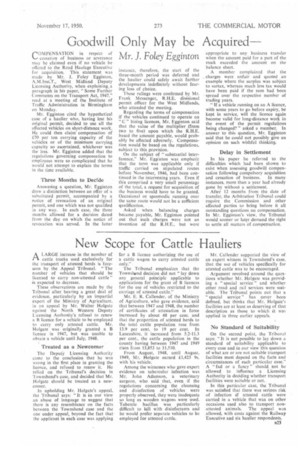Goodwill Only May be Acquired— Mr. J. Foley Egginton r MPENSATION in respect of
Page 57

If you've noticed an error in this article please click here to report it so we can fix it.
cessation of business or severance may be claimed even if no vehicle be offered to the Road Haulage Executive for acquisition. This statement was made by Mr. J, Foley Egginton, A.M.Inst.T., West Midland Deputy Licensing Authority, when explaining, a paragraph in his paper, "Some Further Comments on the Transport Act, 1947." read at a meeting of the Institute of Traffic Administration in Birmingham on Monday.
Mr. Egginton cited the hypothetical case of a haulier who, having lost his original permit, decided to use all the affected vehicles on short-distance work. He could then claim compensation of £70 per ton carrying capacity of the vehicles or of the minimum carrying capacity so ascertained, whichever was the less. Mr. Egginton added that the regulations governing compensation to employees were so complicated that he would not attempt to explain the terms in the time available.
Three Months to Decide
Answering a question, Mr. Egginton drew a distinction between an offer of a substituted permit, accompanied by a notice of revocation of an original permit, and one which was not qualified in any way. In each case, the three months allowed for a decision dated from the day on which the notice of revocation was served. In the latter instance, therefore, the start of the three-month period was deferred and the haulier could safely await further developments indefinitely without fearing loss of choice.
These rulings were confirmed by Mr. Frank Messenger, RILE. divisional permit officer for the West Midlands, who attended the meeting.
Regarding the terms of compensation if the vehicles continued to operate on "C" hiring licences, Mr. Egginton said that the value of the multiplier (from two to five) upon which the R.H.E. based the amount payable, would probably be affected adversely. Compensation would be based on the regulations, subject to this provision.
On the subject of "substantial interference," Mr. Egginton was emphatic that the term was applicable only if traffic carried on stipulated routes before November, 1946, had been continued in the intervening years. Even if this comprised a very small percentage of the total, a request for acquisition of the business would have to be granted. Occasional or spasmodic running over the same route would not be a sufficient qaulification.
Asked when balancing charges became payable, Mr. Egginton pointed out that such charges were not an invention of the R.H.E., but were appropriate to any business transfer when the amount paid for a part of the stock exceeded the amount on the balance sheet.
A member complained that the charges were unfair and quoted an example where the surplus was subject to surtax, whereas much less tax would have been paid if the sum had been spread over the respective number of trading years.
"If a vehicle running on an A licence, with some years to go before expiry, be kept in service, will the licence again become valid for long-distance work in the event of the permit regulations being changed? " asked a member, In answer to this question, Mr. Egginton said that he could not possibly give an opinion on such wishful thinking.
Delay in Settlement
In his paper he referred to the difficulties which had been shown to exist when assessing goodwill compensation following compulsory acquisition and cessation of business. In many instances, more than a year had already gone by without a settlement.
After 12 months from the date of transfer, the Arbitration Tribunal could require the Commission and other affected parties to bring before it all outstanding questions on compensation. In Mr. Egginton's view, the Tribunal would sooner or later demand the right to settle all matters of compensation.




























































































